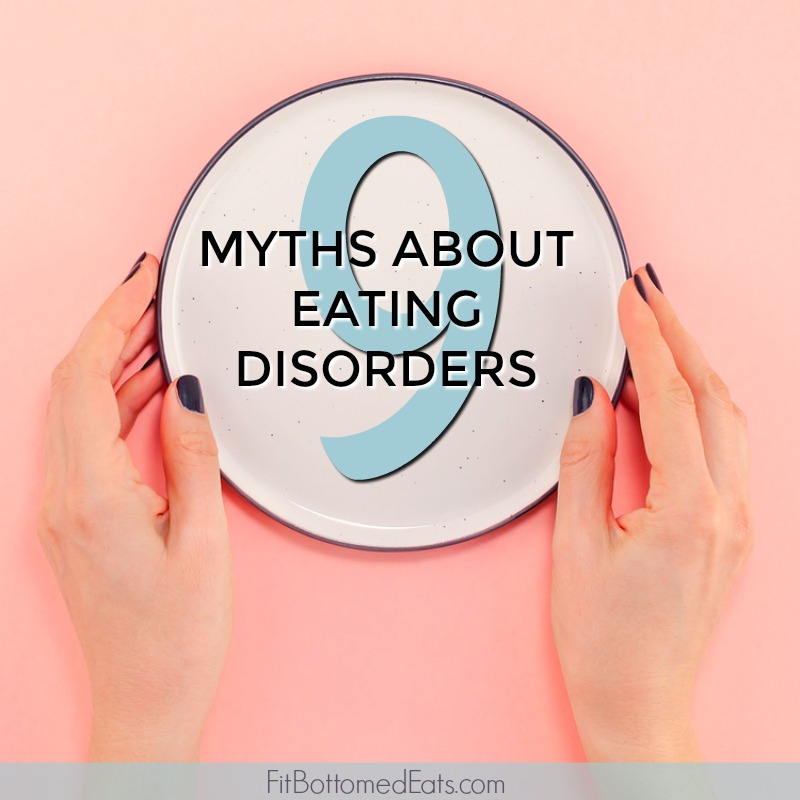9 Myths About Eating Disorders
This week marks National Eating Disorders Awareness Week. To help bring awareness to a serious health issue affecting more than 30 million people, we’re sharing some myths about eating disorders — and the truth about them — from Dr. Allison Chase of the Eating Recovery Center.

9 Myths About Eating Disorders — and the Truth
While there have been recent, tremendous breakthroughs in the science and treatment of eating disorders, widespread misconceptions remain that challenge identification, diagnosis, and early intervention of the disease.
Myth 1: Eating disorders aren’t serious illnesses.
Truth: Anorexia nervosa, bulimia nervosa, binge eating disorder, and eating disorder not otherwise specified (EDNOS) are very real and very serious mental illnesses. Anorexia nervosa has the highest mortality rate of any psychiatric disorder. In fact, women ages 15 to 24 years of age who suffer from anorexia nervosa are 12 times more likely to die from the illness than any other cause of death.
Myth 2: Eating disorders are just about food.
Truth: While eating disorders generally involve obsession with calories, weight or shape, these illnesses are rooted in biological, psychological, and sociocultural aspects. Restriction, bingeing, purging, or over-exercise behaviors usually signify an attempt to manage uncomfortable feelings or control something of substance in the individual’s life.
Myth 3: Eating disorders don’t develop until the teenage years.
Truth: Consider this: research found that up to 60 percent of girls between the ages of 6 and 12 are concerned about their weight or about becoming too fat, and that this concern endures through life. Not surprisingly, the incidence of eating disorders in children is on the rise. Between 1999 and 2006, hospitalizations for eating disorders in children 12 and younger rose 119 percent, according to a 2010 study by the American Academy of Pediatrics.
Myth 4: Eating disorders are a women’s illness.
Truth: While research shows that eating disorders affect significantly more women than men, these illnesses occur in men and boys as well. While males used to represent about 10 percent of individuals with eating disorders, a Harvard study found that closer to 25 percent of individuals presenting for eating disorder treatment are male. The widespread belief that eating disorders only affect women and girls can prevent accurate diagnosis and treatment of eating disorders in a man or boy, even by healthcare professionals.
Myth 5: Only very thin people have an eating disorder.
Truth: While anorexia is often characterized by extreme low weight, many individuals struggling with bulimia, binge eating disorder, and EDNOS are normal-weighted. The misconception that an eating disorder can only occur if someone is very thin contributes to misdiagnosis or delayed diagnosis in many cases, even among those patients seeking support from medical and mental healthcare professionals. Unfortunately, many healthcare experts lack eating disorder exposure and training, which highlights the important role of eating disorder specialists to ensure effective diagnosis and early intervention.
Myth 6: You can tell if someone has an eating disorder by looking at them.
Truth: Eating disorders do not discriminate. Those suffering from an eating disorder have a variety of different body types. The media and other public discussions about eating disorders often focus on a specific diagnosis: anorexia, wherein sufferers often display the symptom of being severely underweight.
Myth 7: Recovery from eating disorders is rare.
Truth: Recovery is absolutely possible. Due to the complexity of eating disorders, recovery can take months or years, but with treatment, many people do recover.
Myth 8: Eating disorders are caused by the media.
Truth: Many people are exposed to the media on a daily basis but only a small percentage of them actually develop eating disorders. Eating disorders are complex and serious illnesses that have biological, genetic and psychological roots. The media can certainly impact how a person feels about their looks, and promote a great deal of pressure to look a certain way, but the media does not cause eating disorders.
Myth 9: Eating disorders are a result of dysfunctional families.
Truth: Historically, parents, especially mothers, have been blamed for mental illnesses, including eating disorders. However, parents do not cause eating disorders. Eating disorders are complex disorders and it is known that a person’s risk for developing an eating disorders is due in large part to genetic factors. Parents, or other caretakers and loved ones play an integral role in helping loved ones with eating disorders recover.
If you are concerned that you or a loved one may have an eating disorder, please visit eatingrecovery.com for more information.
A huge thanks to Dr. Chase for sharing this important information. –Jenn
